by Jenny Savely | Feb 19, 2016

By 2050, the United Nations estimates that the total population will total around 9 billion people globally (United Nations: 2004). Meeting the challenge of addressing the needs of so many people is an opportunity for growth that can be gained through scientific developments and personal responsibility, areas in which 4-H eagerly works to educate youth and adults.
We learn that our everyday behaviors, even if they seem very small, can actually put a lot of strain on our environment when so many people do the same things.
We often ask our youth, “If everyone were to do the same things you do every day, what would that look like? What kind of impact do you think it would have?”.
We know that much of our daily energy use, like the amount of water we use, how much trash we produce, the kind of food we buy and where we buy it, and how much energy we use in our transportation, for example, can make a big difference if we all make decisions that keep our environment in mind.
We can help prevent environmental damage that leads to climate change and human illness by conserving energy and making a smaller ecological footprint. An ecological footprint is the amount of resources from the environment that are required to meet the demands of our everyday consumption of goods. 4-H encourages youth to make thoughtful decisions about their behaviors such as:
- Eating locally grown and in season produce
- Using reusable bags for shopping
- Buying products with less packaging and that are less processed
- Turning lights off when they aren’t in use
- Doing outdoor rather than indoor activities
- Walking, biking, carpooling, or taking public transportation
- Recycling
- Conserving water when brushing teeth and by displacing water in toilet tanks
- Only running washing machines with full loads
However, motivating people to change their behaviors can be difficult. In 4-H we work to encourage young people to understand at an early age the enormous impact they have on the health and well-being of others. The World Health Organization tells us that “…environmental factors are a root cause of a significant burden of death, disease and disability – particularly in developing (poor) countries. The resulting impacts are estimated to cause about 25% of death and disease globally, reaching nearly 35% in regions such as sub-Saharan Africa.” (World Health Organization: 2016). A good portion of environmental damage that affects us in negative ways is caused by our using more resources than our planet has the ability to renew at the same rate we use them and by extracting our resources in harmful ways. This may seem overwhelming, but there are actually very simple things that each of us can do that can significantly help lessen the impact. Actually, when we change our behavior is western countries like the United States, we can make more significant differences since we are one of the primary consumers of energy in the world.
And as always, youth learn not only by DOING but by helping to teach others! We encourage our youth to educate their friends and family as well as to mentor younger 4-H’ers in project areas like environmental science. If your youth or club is interested in learning more about energy conservation and environmental science projects, there are an array of wonderful resources, listed below, to help get you started. Your county 4-H agent is happy to help any youth or volunteer interested in this or any one of the project areas that help provide youth with research based education.
Games: http://www.energystar.gov/index.cfm?c=kids.kids_index
Curriculum: http://www.chesapeakebay.net/channel_files/18256/handout_-_4-h_environmental_curriculum.pdf
http://www.need.org/files/curriculum/guides/Saving%20Energy%20Student%20Guide.pdf
Resources for teachers: http://www.eia.gov/kids/energy.cfm?page=6
http://www.eia.gov/kids/energy.cfm?page=1
http://coseenow.net/antarctica/
United Nations. 2004. “World Population to 2300”. United Nations Department of Economic and Social Affairs: Population Division. United Nations: New York, NY.
World Health Organization: The Health and Environment Linkages Initiative (HELI). 2016. “Environment and Health in Developing Countries”. URL http://www.who.int/heli/risks/ehindevcoun/en/index1.html. Accessed February 5, 2016.
Photo: Wake County, North Carolina 4-H. http://www.wakegov.com/humanservices/family/4h/traditional/Pages/default.aspx
by pmdavis | Feb 5, 2016
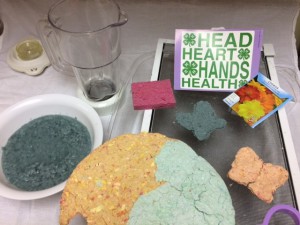
Grow Card Supplies and products
4-H literally got its start with gardening. The very first 4-H Clubs focused on growing tomatoes and corn for boys and canning for girls. Many youth and volunteers still enjoy gardening projects today. One great curricula that is used is the Junior Master Gardening Program. This program allows youth to enhance their life using gardening as the spark of interest. Gardening enriches youth’s lives, promotes good health, gives a sense of environmental awareness and saves money.
One of the activities I enjoy doing with youth combines gardening with recycling and crafting. As a group we will make our own paper grow cards or ornaments that have seeds embedded in them. Once the cards are dry, we deliver them as a service project. The cards are fun and inexpensive to make and are a perfect activity for your next club meeting! Try making them as valentines for Valentines Day. For beginners, we recommend growing tomatoes, lettuce, peppers, cucumbers, basil, chives, or parsley. Not into vegies? Try starting marigolds, cosmos, sunflowers, zinnias, pansies, or petunias.
Download our detailed factsheet with photos and directions. This activity is great for any occasion when you need a card or small gift. You can use as party favors by making them into ornaments using raffia to hang them from a tree or gift bag. You can take them to a nursing home, veterans center, hospital or other site as a service project for your club. Just be sure to share with the individual that they need to plant your card or ornament. It is a great way to help youth share their joy of gardening with others.
Other Extension gardening resources include:
• Florida Vegetable Gardening Guide
If you have a green thumb, consider going “totally green” as a 4-H gardening volunteer! 4-H needs caring adults like you to share their knowledge and passion for gardening with the next generation. Through the 4-H gardening project, youth not only learn gardening knowledge and skills, they also learn responsibility, teamwork, and other life skills that will help them grow up to be compassionate and competent citizens. To get involved, contact your local UF IFAS Extension Office, or visit Florida 4-H.
by ewestbrook | Nov 13, 2015
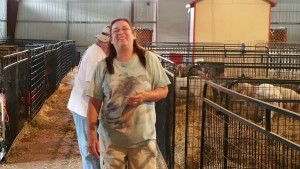
For more than 33 years, Priscilla Weaver has been teaching youth about animal science through the 4-H club program.
This time of the year you can find her at the North Florida Fairgrounds in the livestock buildings. As the North Florida Fair’s Livestock Director she’ll be busy putting on a great livestock show and competition for youth and adults. Priscilla Weaver is passionate about growing the 4-H animal science program. For more than two generations (33 years) Priscilla has been teaching youth about animal sciences and animal husbandry as the Kapra Kids Dairy Goat 4-H Club Leader in Wakulla County, Florida.
Priscilla started the club when she saw a need for her children and their friends to have an opportunity to participate in 4-H. “Youth need things like 4-H in their lives to grow up well,” says Priscilla. When asked why she thinks youth need 4-H Priscilla replied, “4-H teaches young people so many things, things like responsibility, caring and the ability to see a project through to its end.”
Priscilla has raised dairy goats her whole life, so when she started her club she worked with her club members in that project area. Her club has had as many as 16 members before and has won uncounted number of awards and ribbons showing their goats and their dairy by-products like cheese and soap at the Florida State Fair in Tampa, Florida
. Priscilla feels strongly about teaching today’s youth about animal husbandry saying,
“It teaches them so many things; math and science, recordkeeping, planning and responsibility. Participating in a 4-H animal project also teaches caring and empathy by having responsibility for an animal,” says Priscilla.
Empathy and caring are two traits Priscilla has in abundance. When not volunteering for 4-H, she spends her free time working at the fair, caring for her own livestock, or volunteering with the senior group at her local church. These traits also display in the activities of Priscilla’s 4-H club as they participate in many community service projects and also in her leadership of multi-club service projects at places like the local senior center.
When asked what has kept her going as a 4-H volunteer for so many years Priscilla will tell you that it’s because, “she loves working with the youth.” Because of volunteers like Pricilla, 4-H is able to help youth grow resilience, empathy, and responsibility through animal science programs. These are life skills that will help youth be successful no matter what career path they choose. If you want help empower young people to be the best they can be by sharing your passions in a meaningful way Like Priscilla has, consider becoming a 4-H volunteer. The Florida 4-H Program offers a wide variety of volunteer roles to fit your schedule, interests and skills. Contact your local UF IFAS Extension Office or visit http://florida 4h.org/volunteer for more information on how to volunteer today.
by Yolanda Goode | Oct 23, 2015
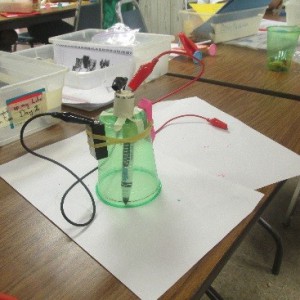
A scribble bot was built by a team of Gadsden County 4-Hers during the “It’s Alive! Junk Drawer Robotics Day Camp.”
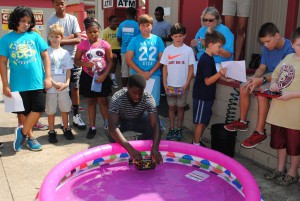
More than 60 youth participated in the district Junk Drawer Robotics Challenge this summer.
Everyone has a measure of creativity in them but how we express our creativity is our choice. What is creativity? I am glad you asked. Creativity is defined as the ability to make new things or think of new ideas. Creativity can be expressed in a tangible or intangible way. It is also the ability to take something known and present it or use it in a new way. So how does Florida 4-H grow creativity in our youth? Well, you know I am glad you asked that too. One way is that Florida 4-H provides opportunities for youth to express their creativity through their project work in one of the national 4-H initiatives: 4-H Science, Healthy Living, Citizenship, and Mentoring.
One of the ways that Florida 4-H is growing creativity is through our Junk Drawer Robotics Program. The 4-H Robotics Program is designed not only to teach youth about science and physics, but also the engineering design process. Every good engineer is creative! Several counties offered a day camp this summer to teach youth about forms of energy, gears, motors, switches, circuits, and pulleys. Then, they were given everyday “junk” to build a robot and make it move or complete a task using the science concepts they had learned. Youth worked in teams and used their creativity and curiosity to design, build, and test their robotics. Youth came together for a district challenge in July and will also have the opportunity to compete November 14th during 4-H Day at the North Florida Fair at the Junk Drawer Robotics Contest. Last year, more than 20 teams competed to build robots that could paint out of scrub brushes, solo cups, and toothbrushes.
Florida 4-H is sending a team of youth and volunteers to the National Maker Summit in Washington, DC November 7th. The Maker National Youth Summit is for the creative and curious young minds of the next generation of innovators. Participants make what they can with a variety of materials from a range of fields, utilizing their resourcefulness and creativity. That same weekend, a 4-H Tech Wizards Team will be hosting a SeaPerch Challenge during the 4-H Marine Ecology Event. SeaPerch is an underwater remote controlled robotic platform that Florida 4-Hers can participate in. Engaging in Florida 4-H from the county to state levels opens an array of opportunities for creative expression via leadership roles, volunteer service, public speaking, teaching, photography, talent showcase, culinary arts, and many other areas. Learn more about opportunities for youth on our webpage or watch this month’s Make a Difference Monday volunteer training on how to Navigate 4-H Events and Activities.
There are many opportunities with Florida 4-H for creativity expression but did you know many youth will not have the chance. Why, you ask? I am definitely glad you did. We need more adults who will be committed to the positive youth development process that happens with 4-H to become a club volunteer. Working with the local 4-H Agent as part of the leadership team, you will find many avenues as well for creativity expression and growth as you help local youth; “Make their Best Better.” Learn more about our volunteer opportunities with Florida 4-H: http://florida4h.org/volunteers_/ or contact your local UF IFAS Extension Office.
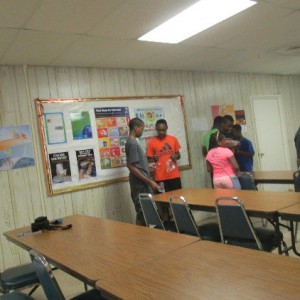
Counselors practices leadership skills by leading teambuilding activities at robotics day camps
by Niki Crawson | Oct 9, 2015
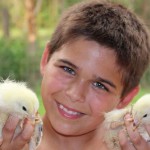
Noah, a Holmes County 4-H member, is learning responsibility through the 4-H Chick Chain project.
Regardless of the age-old debate, “which came first, the chicken or the egg?” one thing is certain- raising chickens is a big responsibility. One of the newest and most creative ways that some of our Florida 4-Hers are learning the importance of being responsible is through the 4-H Chick Chain pilot program.
This year, six counties in the Florida Panhandle partnered with Alabama 4-H to offer the Chick Chain program. The goal of this project is to help youth learn life and workforce skills while learning how to raise and show chickens. Thirty-six Florida 4-H members chose to take on the responsibility of raising 18, two-day old chicks from May through October. Over the course of the program, youth participated in workshops to learn how to care for their chicks, keep records of their project, and how to prepare their animals for a show. This past Saturday marked the culminating event of the project when youth participated in a show and auction in Ozark, AL. During this event, youth competed in a showmanship competition, record book competition, and poultry quiz. All three events counted towards their overall score.
Members also had a short course in entrepreneurship- they were required to meet with potential buyers and market their hens. Life skills were clearly present in every aspect of the 4-H Chick Chain program which aided youth in the further development of not only responsibility but also confidence, capability, and compassion. When asked about his experiment, Noah, a Holmes County 4-Her shared:
“Chick Chain is a great opportunity to learn about responsibility and respect for other people and animals. You get to raise 18 of your very own chickens for a couple months and then get to take them to a show with your fellow 4Her’s to compete for ribbons and money. You also learn about proper sportsmanship. I love it!”
Based on participant’s feedback, we will be expanding the pilot next year and making some exciting programmatic changes. Holmes County 4-H parent and club leader, Jewellyn Owens, was instrumental in developing the Chick Chain pilot for Florida because she saw the potential this program had to help youth learn valuable life skills while increasing their knowledge about agriculture. Jewellyn shares:
“My family Loves Chick Chain. It is a great program for children wanting to do a 4-H livestock program but their parents don’t feel they are ready yet or can’t afford the cost of the larger livestock. Chick Chain has taught my children respect, sportsmanship, caring for another living creature and responsibility. My children love seeing their chicks grow from 2 day chicks to full grown egg laying chickens. Best part is getting to eat their chicken’s eggs. I also feel it teaches them other aspects of life like record keeping, writing, leadership skills, financial responsibility all things that will help them years down the road.”
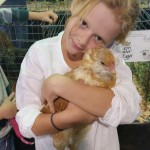
4-Hers spent 6 weeks learning how to care for their chicks, biosecurity, showmanship, and recordkeeping.
If you would like to help 4-H grow responsibility in your community (through this program or others) consider becoming a 4-H volunteer. For more information about becoming a volunteer, or to find out about next year’s 4-H Chick Chain program, contact your local UF IFAS County Extension Office. We are also looking for sponsors to help expand this program.
For more information, check out:
by Whitney Cherry | Oct 8, 2015
 Growing up, we lived on a farm. At the age of 8, and not weighing much more than 50 pounds, my dad called me outside to a relatively small pen that he had fenced off the weekend before. He taught ag, so farming was more of a hobby for us, but this was something new. I noticed my grandpa’s old beat up blue horse trailer backed to the pen’s gate. I can remember my dad helping me climb onto the wheel well of the trailer and peek through the slats to see two yearling steers. One black and one red and white. “Which one do you want?” he asked. At the time I didn’t know that the judge always picks the black cow to win, in fact, I didn’t know there were any judges involved at all. I didn’t know why these cows were at our house about to go into a special pen. All I knew was that red cow was beautiful, and that’s the one I chose. My dad laughed and said, “He’s a haus.” So that became his name.
Growing up, we lived on a farm. At the age of 8, and not weighing much more than 50 pounds, my dad called me outside to a relatively small pen that he had fenced off the weekend before. He taught ag, so farming was more of a hobby for us, but this was something new. I noticed my grandpa’s old beat up blue horse trailer backed to the pen’s gate. I can remember my dad helping me climb onto the wheel well of the trailer and peek through the slats to see two yearling steers. One black and one red and white. “Which one do you want?” he asked. At the time I didn’t know that the judge always picks the black cow to win, in fact, I didn’t know there were any judges involved at all. I didn’t know why these cows were at our house about to go into a special pen. All I knew was that red cow was beautiful, and that’s the one I chose. My dad laughed and said, “He’s a haus.” So that became his name.
As it turns out, Haus was a show steer. With my dad’s help I spent a lot of cold, dark evenings after school walking that steer with fingers so numb I thought they’d break off if he jerked too hard. I learned to groom him. I learned to lead him. I learned how to feed him properly. And I learned that extra hoses and an automatic waterer were well worth the investment the next year when it cut down on the number of trips I had to make with cumbersome, sloshing, five gallon buckets of water to make sure the cows didn’t go thirsty.
I quickly fell in love with the whole idea of showing cattle, and by the Fed Cattle Show, Haus was well over 1,500 lbs. Incidentally, I hadn’t gained an ounce – in retrospect it might have had something to do with hauling those buckets of feed and water. However, I wasn’t scared. You see, as Haus grew, so did I. Not physically as I mentioned before, but my skill had grown, and so had my confidence.
For those of you who don’t know, showing cattle isn’t like other 4-H competitions where you are placed in age categories. The classes are based on animal weight in a steer show. So I walked in the ring to show with people more than twice my age. I didn’t know any better. As luck would have it, Haus not only placed first in his class, but he placed 2nd in the show as Reserve Grand Champion behind the steer everyone said was the clear favorite. What they couldn’t believe was that an eight year girl with less than a year of show experience and a white-faced red cow had beaten a sixteen year old veteran pro with a pure bread black Angus on her lead. Apparently it was a bit of a toss up between her steer and mine as to which would take the Reserve Champion spot. And as I was repeatedly told, when it’s close, the black cow always wins – no matter who’s on the lead.
From this experience I learned that it didn’t matter my age or size, I could do anything. The confidence I gained from this experience sparked a courage in me that pushed me to become a champion in poultry, livestock, and land judging, in public speaking, and in showing rabbits, chickens and hogs as well. I used each of those experiences to fuel countless other successes in life. And each time I was further building that courage. The same courage that gave me the strength of character to be honest, to show integrity when it’s not easy, and to care for others around me. It gave me the strength of character to make wise choices even when they were widely unpopular and to stand alone when it would have been easier to follow the crowd.
It certainly hasn’t always been easy. And I’ve failed a time or two. But, I continue to grow – much like the 4-H motto suggests, “To Make the Best Better”. I will be forever grateful to my mom and dad for choosing 4-H as the vehicle to start my lifelong journey toward an upstanding character. Through them and their support and guidance I came in contact with agents, volunteers, and friends from other clubs and counties who have helped me grow. Now it’s my turn and yours to inspire the next generation. How will you empower youth in your community to grow through 4-H? 4-H offers a wide range of opportunities for youth and adults- everything from animal science to aerospace. To volunteer or enroll a child in 4-H, contact your local UF IFAS County Extension Office or visit http://florida4h.org. It’s never too late to start growing character and make a positive difference!









